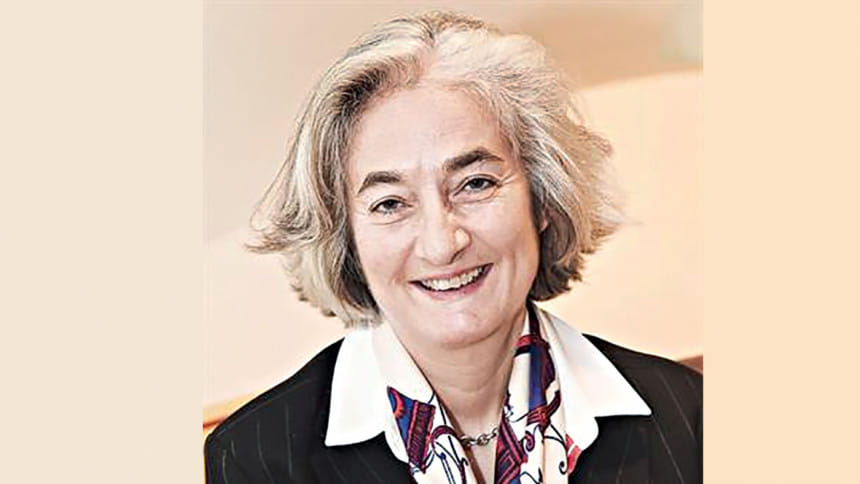Indo-Pacific Region: We want cooperation, not confrontation

France does not want confrontation but cooperation in the Indo-Pacific region that is becoming a centre of geopolitical competition, said Marie Masdupuy, the French ambassador to Bangladesh.
Confrontation is unnecessary and counterproductive, she told The Daily Star in an interview recently.
"We are all interdependent -- economically, technologically, socially. My country sees itself as a solidary and reliable partner, aiming at keeping an unstable world order as balanced as possible. This is what we call a third way."
Masdupuy's comments come as the US and China are competing to gain an upper hand in the Indo-Pacific region, with the small states under pressure to pick a side.
French President Emmanuel Macron first brought up the subject of "third way" when he visited Dhaka last month. He said: "Based on democratic principles and the rule of law, we want to propose a third way -- with no intention to bully our partners or to lead them to an unsustainable scheme in a region facing new imperialism."
France's foreign policy has historically been leaning toward as much independence in decision-making as possible, Masdupuy said.
This includes supporting France's friends in the region, such as Bangladesh, in attaining their strategic autonomy.
Asked about the criticisms lobbed at France's way for placing greater emphasis on business than addressing the allegations of violations of human rights and democracy, she said such criticisms invariably come when her country strikes important commercial deals.
"But, in our view, contrary to what the supporters of isolationism advocate for, the best option is always dialogue, trade and human exchanges."
Macron's visit was an occasion to review all issues including democracy, human rights, rule of law, apart from Bangladesh's commitment to purchase ten aircraft from European manufacturer Airbus and the letter of intent signed for the second Bangabandhu satellite.
France also agreed to set up a satellite manufacturing unit in Bangladesh.
The first satellite, manufactured by Thalès for Bangladesh, was a communications satellite that did not require a local industry base once in orbit, said Masdupuy, whose tenure in Bangladesh began on December 12, 2022.
The second one will be an Earth Observation satellite system and will contribute to economic development by providing useful data in various fields such as agriculture, land mapping, urban planning, climate change and so on.
The programme includes building up skilled human capital, a local manufacturing capability and geo-information applications.
As a result, Bangladesh will become a sovereign space nation and will be able to master all the related technologies and make the best use of the geo-data by itself.
In a few years, Bangladesh will avail its own home-made observation satellites, said Masdupuy, whose foreign service career began in 1991 with a posting in the Soviet Union.
"France wants to see itself as a start-up nation. Why can't Bangladesh become the start-up nation of the region in the mid-term future? The partnerships we would like to build with various sectors of your economy and society are truly meant as partnerships between friends."
Asked if France would increase funding in Bangladesh, she said the French Development Agency's commitments could increase after Macron's visit from the average annual commitment of 300 million euros, most of which are tied up with climate-related projects.
France also identified a new project to restore the mangrove forests of the Sundarbans. Besides, France has important projects in the pipeline related to water treatment in Dhaka and Chattogram, improving air quality and urban infrastructure and services in 86 middle-sized cities of Bangladesh.
"We are continuing to work with public financial institutions to increase the mobilisation of private investments in climate-related projects. We are partnering with major multilateral development banks as well as other bilateral stakeholders, such as Denmark, Germany etc."
France is also preparing a research partnership with the International Centre for Climate Change and Development.
"Your country has tremendous experience in terms of adaptation to climate change. We would like to streamline it so that other countries can benefit from it."
France is eager to support the energy transition, which is not easy for countries like Bangladesh that heavily rely on coal and gas. There is also an issue of land availability when it comes to building large-scale facilities, be it solar or nuclear.
However, small modular reactors are now being developed by the French state-owned EDF and those will require only 20 to 30 acres.
Besides, some French companies are working on multiple renewable energy projects like solar and wind which should soon bear fruits.
France is also very keen to collaborate on biogas and waste-to-energy, Masdupuy said.
The bilateral trade between the two countries amounts to about 5 billion euros, with the majority of French imports being garments.
France would like to diversify the range of products within both baskets: French companies can offer food and gastronomy products, agro-processing techniques, and various infrastructures including high-speed trains, renewable energy devices and ICT services.
"Your companies can also be interested in our market. We all heard about your litchis gaining ground back in France, why not other fruits like kathal [jackfruit] and mangoes?"

 For all latest news, follow The Daily Star's Google News channel.
For all latest news, follow The Daily Star's Google News channel. 



Comments